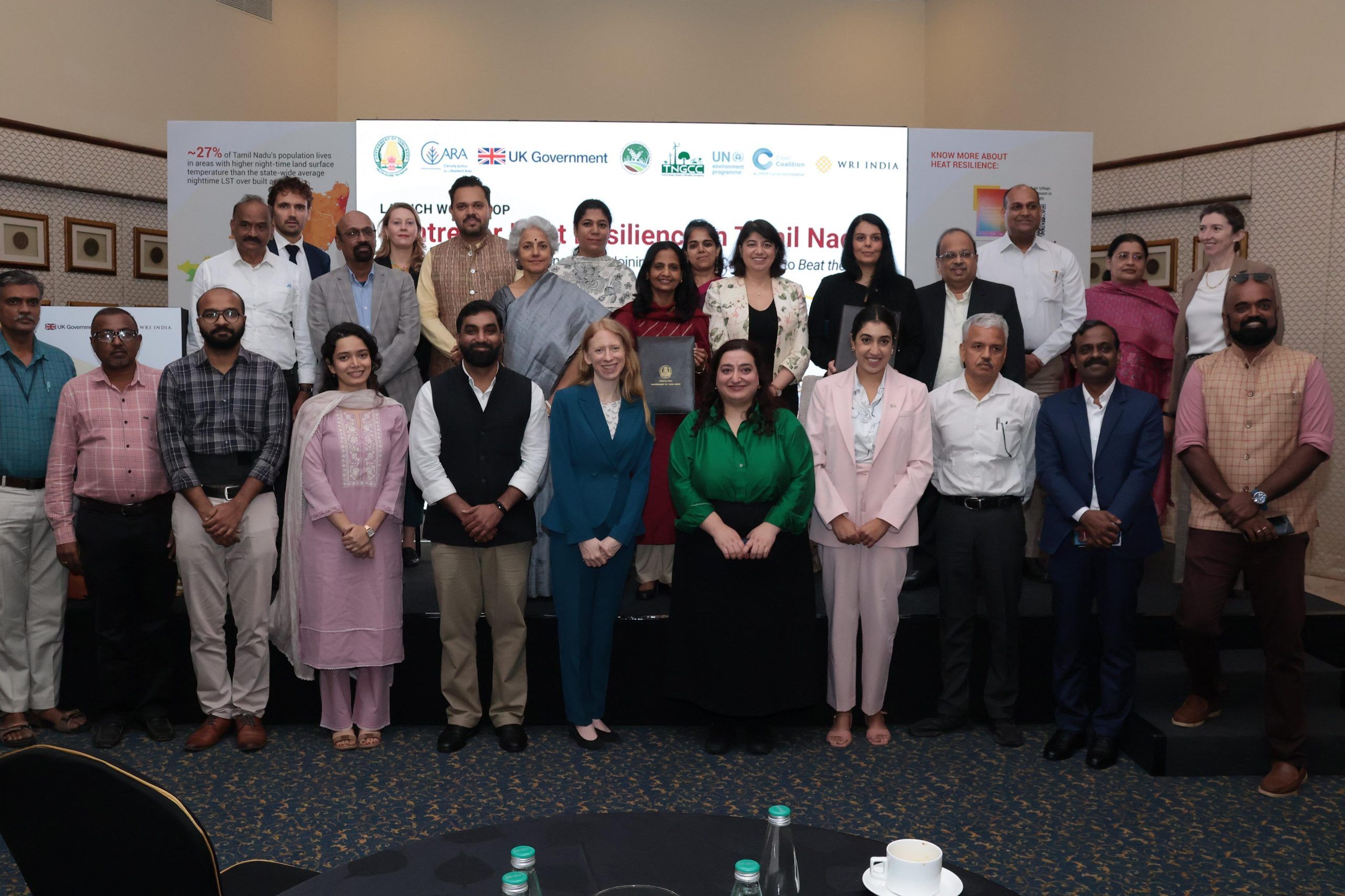Government of Tamil Nadu and UK Government launch Heat Resilience Centre with Support from UNEP’s Cool Coalition

The Government of Tamil Nadu and UK Government jointly launched a Heat Resilience Centre for the State, a significant step forward in strengthening the state’s capacity to address rising extreme heat. The initiative, supported through the UK’s flagship Climate Action for a Resilient Asia (CARA) programme is being implemented in partnership with the United Nations Environment Programme (UNEP) Cool Coalition, under the Swiss Agency for Development and Cooperation (SDC) funded BeCool project, and the World Resources Institute (WRI). The programme will run until September 2026.
A Letter of Intent (LoI) was signed on 21 November 2025, between Tamil Nadu Green Climate Company and the UK Government, and was formally exchanged between Supriya Sahu IAS, Additional Chief Secretary, Environment, Climate Change and Forests Department and Seema Malhotra MP, Parliamentary Under-Secretary of State, Government of United Kingdom.
The Heat Resilience Centre will serve as Tamil Nadu’s nodal institution to coordinate heat-risk management across sectors. The Centre will:
- Establish a scientific and institutional governance framework
- Build technical capacity across departments including health, urban development, disaster management, and planning
- Generate evidence, climate data, and policy-relevant tools
- Support city- and district-level heat action planning
- Develop bankable projects for funding from development banks, philanthropies, and climate finance institutions
Tamil Nadu now becomes one of India’s first states to create a dedicated institutional mechanism to address extreme heat.
Speaking at the launch, Dr. Balakrishna Pisupati, Country Head, UNEP India said, “Tamil Nadu’s leadership role in dealing with climate change, including on extreme heat is laudable. Under the leadership of Department of Environment, Climate Change and Forests, UNEP is pleased to collaborate with the Department on climate adaptation and mitigation as well as a number of issues related to environmental management”.
Reiterating on the urgency to address extreme heat, Tmt. Supriya Sahu said, “Accurate heat maps and clearly defined heat-risk zones should be an essential foundation for climate readiness in the State. Tamil Nadu is taking a science first approach to identify heat risk zones in every city, so that planners, health systems, and local bodies know exactly where vulnerabilities lie. With high resolution satellite data and ground sensors, we should be able to map heat the way we map floods or air pollution. This will enable us to redesign neighbourhoods, guide construction, strengthen ventilation corridors and create pockets of thermal safety. Every urban plan in Tamil Nadu must speak the language of heat resilience.”
UK Minister for the Indo-Pacific, Seema Malhotra added, “Extreme heat is one of the most urgent climate challenges we face. Without targeted action, the impacts of heat stress will continue to grow, affecting the lives and livelihoods of millions of people across the region. The UK is proud to partner with Tamil Nadu in this pioneering effort. The state has already demonstrated visionary leadership being the first Indian state to establish a Green Climate Fund and recognise heatwaves as a state-specific disaster. Today’s launch of the Heat Resilience Centre marks an important milestone in this leadership journey.”
Tamil Nadu has also strengthened its commitment to climate impacts while charting a sustainable future by joining the global Beat the Heat Implementation Drive, launched on 11 November 2025 at COP30 in Belém, Brazil.
Launched by the Brazil COP30 Presidency and the UNEP-led Cool Coalition, Beat the Heat / Mutirão contra o Calor Extremo is a major international effort to accelerate the deployment of sustainable cooling and heat resilience solutions in cities worldwide turning the ambitions of the Global Cooling Pledge into concrete, on-the-ground action. 185 cities and 83 partner organizations have joined Beat the Heat; this is alongside 72 Global Cooling Pledge signatories. 15 Indian cities joined the drive out of which11 are from Tamil Nadu including Avadi, Chennai, Coimbatore, Erode, Madurai, Salem, Tambaram, Thoothukudi, Tiruchirapalli, Tiruppur, and Vellore.
By joining Beat the Heat, cities gain access to curated global resources and technical assistance to, plan for extreme heat, expand passive cooling and nature- based solutions, accelerate adoption of energy efficient, climate friendly cooling and integrate cooling resilience into urban development plans.
Tamil Nadu is among India’s leading states taking innovative steps in extreme heat response and sustainable cooling.
Under the UNEP BeCool Project funded by the Swiss Agency for Development and Cooperation, the state is implementing the Green Schools Initiative in 197 Government schools across the State, targeting heat resilience through passive cooling and nature- based solutions. Tamil Nadu is soon set to become the first state in India to mandate minimum passive cooling standards in all new buildings, reinforcing its national leadership in green building codes. The state is also embedding district cooling into city-level and state-level plans, guiding the shift toward large-scale, energy-efficient and climate-resilient cooling infrastructures.
Tamil Nadu’s pioneering work on extreme heat and sustainable cooling including initiatives in schools, affordable housing, and urban areas has been highlighted in the newly released UNEP Global Cooling Watch 2025 report at COP30.
